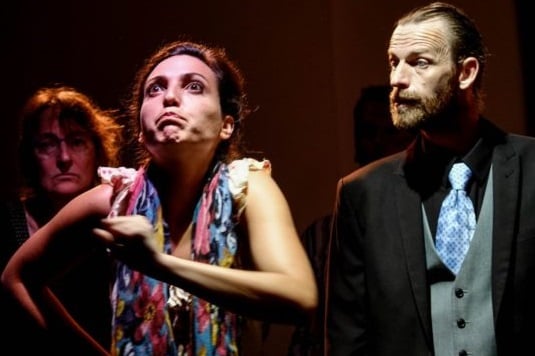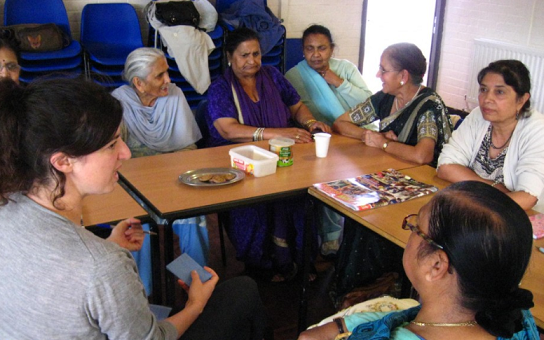
Acting Now, a theatre company funded by Cambridge City Council
How to… get funding and support from your local council
When is it the right time to approach a council with your idea for an arts project? And what support can you expect to receive? Arts Development Officer Akua Obeng-Frimpong offers her wisdom.
As an Arts Development Officer at Cambridge City Council, I’m the first point of contact for arts and culture queries. Approaches I receive from arts practitioners and organisations include requests to promote new work/projects, and enquires about accessing funding or establishing connections to develop projects. Where we can’t assist directly through our department, I’ll provide contacts in other parts of the council or outside who may offer answers.
What are the key issues they are addressing in your borough, district or ward?
An authentic connection with your local council may feel like an endorsement – a large organisation acknowledging who you are and what you do – but it might be more useful to consider your local council as a resource, not only for funds but for knowledge about your community, which could aid the success of your delivery.
It’s a resource that you can visit more than once, and it pays to take the time to understand a little about how it operates.
When should I get in touch?
The moment you initiate a conversation with your council, you are beginning a relationship which, over time, should see developments in the progression of your project or organisation. You are ready to talk to your council when you have an idea that could be of benefit to the local community. You can’t be expected to know it all, besides our agenda is liable to change depending on budgets or changes in government.
You can help yourself by considering the short- and long-term goals of your project. Being realistic about what you might be able to achieve in a year or three years will help you focus your enquiries. Be clear about what your offer is and who it’s for (age group, location, circumstance). Ask yourself who else is developing work like yours in the area. How can you connect with audiences? Present an idea on spec to genuinely apply it to the area in which you’re based.
If you’ve never previously been in touch, this doesn’t automatically work against you. Just assess the situation; it can’t hurt to seek advice from a more established organisation or perhaps even partner with them to inject experience and reputatation into your offer.

Who should I speak to?
Be curious, and make the most of your council’s public-facing channels. Where a council welcomes you to get in touch with queries, make the most of it. For example, at Cambridge City Council we encourage prospective applicants to contact us before submitting application for grants or commissions. It’s our job to answer your questions. The grants team or arts development officers would appreciate knowing your intentions so that they can guide you in your application/approach.
Council staff can help you assess whether your project is appropriate, and could save you time and sweat. Pick up the phone or initiate an email correspondence. Introduce yourself and your work and have your questions ready.
Consider connecting with a local councillor – their details should be publicly available and you might consider attending their surgeries, an opportunity to pose questions face to face. On occasion, we’ll receive an approach from someone with a new project who has made a connection with one of our councillors. Whilst they can’t influence your access to funds, a councillor may be able to champion your work to decision makers. Their moral support might be newsworthy and it grounds your activity within the context of your town/city in a way that may help to illustrate potential need to prospective collaborators, audiences and other funders.
Many councils will offer workshops detailing the funding application process. These opportunities might only come once a year. If you can’t make it, get in touch and request copies of presentations or hand outs. Key information should also be available online.
An unfortunate reality is not every local council has an arts development team or officer. If this is the case in your area, it’s important to take the time to understand what the agenda of the council is. What are the key issues they are addressing in your borough, district or ward? You might use this to inspire the subject of your project. If there aren’t direct opportunities for arts funding, there may be other services addressing that issue that could support your project, such as tourism, sports and fitness, environment, parks and playgrounds.
It’s a long game that requires your curiosity and attentiveness
What support could I receive?
Funding is usually the desired end-goal but the playing field is – and always will be – highly competitive. Success will most likely result in a small contribution to your costs, so that as many quality projects as possible can access the pot.
If you are fortunate to receive a grant from your council, manage this relationship and be fastidious in your reporting and communications. The council’s decisions are audited to ensure that public money is used effectively and, as such, they require applicants to have the systems and processes in place to manage their projects and finances. Where you have uncertainties, contact the grants team for advice.
Local knowledge is another resource that is usually available via your council. Data about the demographics of your town or city in relation to income, school attendance, age, wellbeing, for example, can inform the focus of your projects and your audience development. It can also be useful when approaching other funders, to illustrate your aims or the context of your work.
A better understanding of the geography in your town is also useful in identifying key areas where funding is being targeted. Additionally, the knowledge of other creative practitioners or companies delivering similar work in your town/city might open the door to collaborations, sharing knowledge and maximising resources, or simply help you refine your idea.
There is no singular, sure-fire way to a successful relationship with your council, but understanding the nature of the beast through its values, goals and some processes may go a long way to help you establish a useful contact. It’s a long game that requires your curiosity and attentiveness as well as an appreciation that you might not receive what you expect at the outset, but along the way you could amass information and insights that will influence your success in the long-term.
Akua Obeng-Frimpong is Arts Development Officer at Cambridge City Council.
cambridge.gov.uk
E [email protected]
Tw CAN_Cambridge, MyCambs, startnowarts
Join the Discussion
You must be logged in to post a comment.